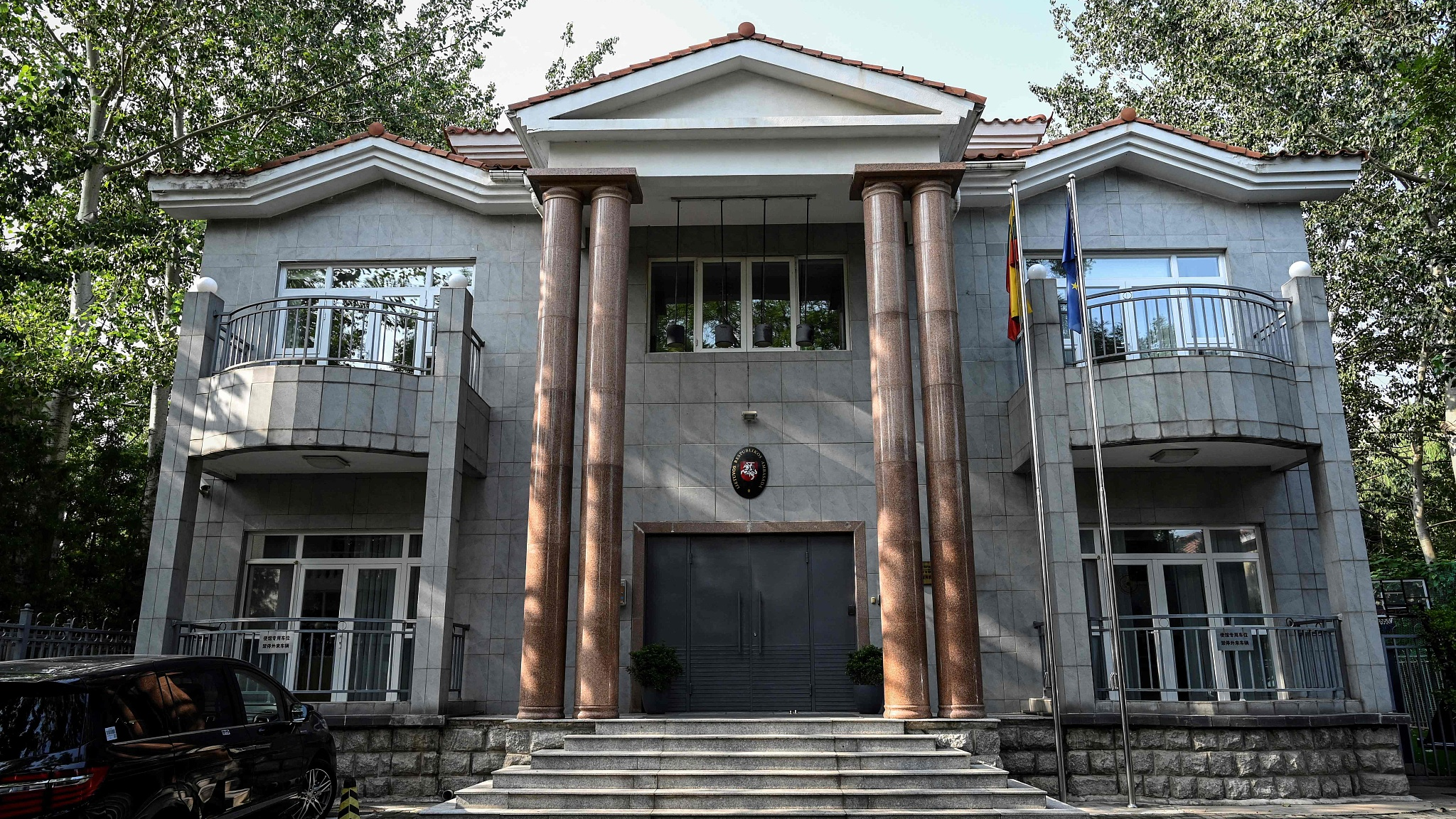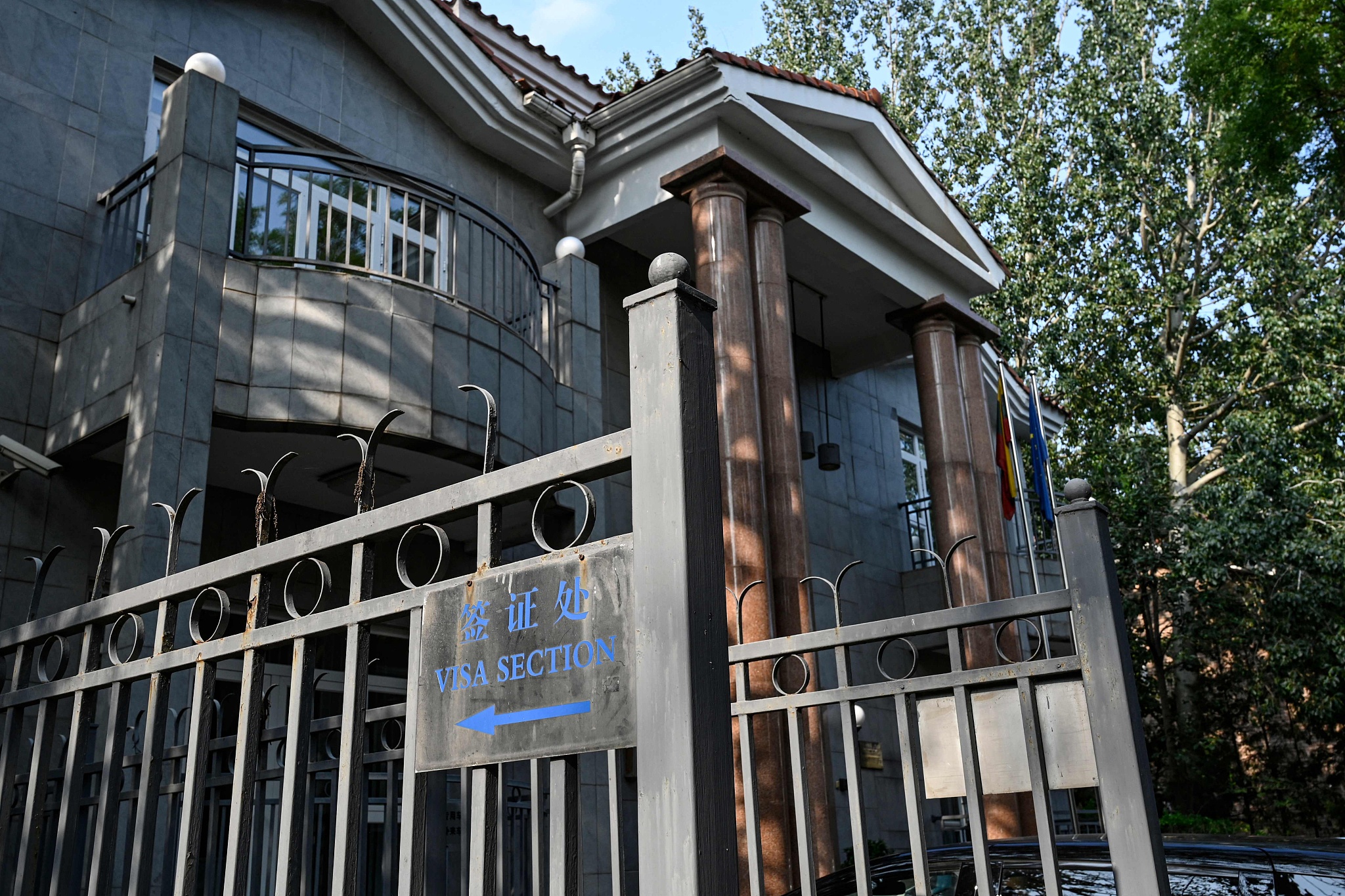
The Lithuanian Embassy in Beijing, capital of China, August 10, 2021.
The Lithuanian Embassy in Beijing, capital of China, August 10, 2021.
Editor's note: Zhou Wenxing is a research fellow at Huazhi Institute for Global Governance, Nanjing University, and former Asia Fellow at John F. Kennedy School of Government, Harvard University. The article reflects the author's opinions, and not necessarily the views of CGTN.
The Chinese government decided to recall its ambassador to the Republic of Lithuania and also demanded the Lithuanian government recall its ambassador to China, according to a Chinese Foreign Ministry spokesperson on Tuesday. This rare decision came after the Baltic state "in disregard of China's repeated representations and articulation of potential consequences," allowed China's Taiwan region to set up a "representative office" in its capital of Vilnius under the name of "Taiwan."
Having established diplomatic relations with the Chinese government in 1991, the Lithuanian government should have been well aware of the high sensitivity of the Taiwan issue. Why does Lithuania risk challenging the core interest of the world's second largest economy?
Some speculate that behind Lithuania's logic are economic concerns. But this argument can hardly hold water. According to recent trade statistics, the bilateral trade between Lithuania and the Chinese mainland from January to April in 2021 reached more than $800 million while the bilateral trade volume between Lithuania and China's Taiwan region was roughly $46 million during the same period.
Other factors must be at play. Although ideology and domestic politics help to understand the European Union (EU) member state's diplomatic act, the strategic factor in the global context of some Western countries' anti-China alliance led by the U.S. government has obviously emboldened the Lithuanian government. In fact, Lithuania has become more anti-China over the past few years when the U.S. positioned China as a so-called strategic competitor.
For example, earlier in March of this year, Lithuania quit the Cooperation between China and Central and Eastern European Countries (also known as 17+1), an initiative led by China to promote business and investment relations between China and 17 Central and Eastern European Countries. Lithuania also joined the U.S. and some other EU countries to launch untenable criticisms against China on domestic issues concerning Xinjiang and Hong Kong.

The Lithuanian Embassy in Beijing, capital of China, August 10, 2021.
The Lithuanian Embassy in Beijing, capital of China, August 10, 2021.
The Baltic state seemed to feel more encouraged to exploit China's internal affairs, eyeing these matters as a chance to develop closer ties with the U.S., which has repeatedly expressed its strong willingness to "support" Taiwan since U.S. President Joe Biden's inauguration in January. After Taiwan authorities announced they will establish an office in Lithuania on July 20, the U.S. government applauded the Lithuanian government's decision by immediately issuing a statement on the website of the American Institute in Taiwan.
Despite the U.S. applause, it remains unknown to what extent the Lithuanian government will be rewarded for its reckless move. But there is no doubt that challenging the internationally recognized one-China principle is certain to adversely impact China-Lithuania ties and the EU at large.
The Chinese government's decision to recall its ambassador to Lithuania will cast a shadow over political and diplomatic relations between the two countries. It should be noted that the last time China recalled an ambassador was in 1995, when the U.S. government issued a visa to Lee Teng-hui, then leader of the Taiwan region, who was seeking separation from the Chinese mainland. The downgrading of China-Lithuania diplomatic relations will inevitably impair economic ties and cultural exchanges, among other links, between the two countries.
The EU may also be caught in a dilemma due to Lithuania's unilateral action of crossing the Chinese government's red line of safeguarding national sovereignty and territorial integrity – a provocative move that will invite China's countermove and may in turn affect the relationship between China and the EU.
For the Lithuanian government, it is less likely to achieve what it hoped by taking advantage of China's domestic issue. The risks clearly outweigh the benefits. The Baltic state should stop being penny wise and pound foolish on the Taiwan issue by immediately rectifying its wrong decision and taking concrete measures to undo the damage.
(If you have specific expertise and want to contribute, please contact us at opinions@cgtn.com.)

